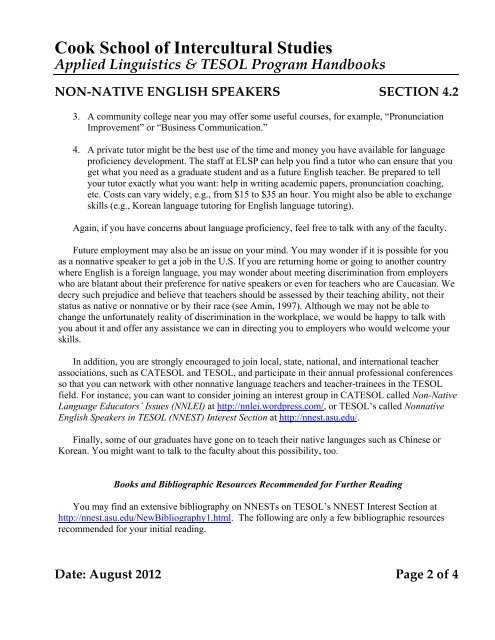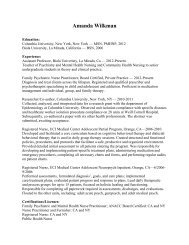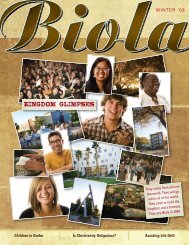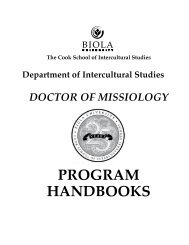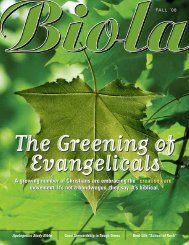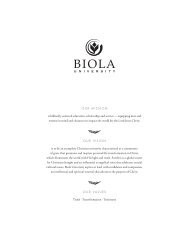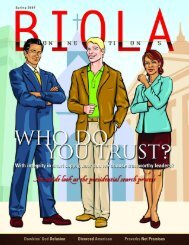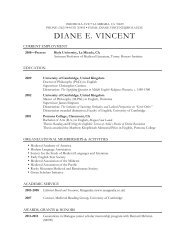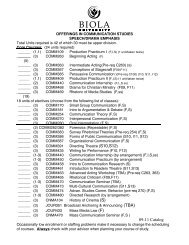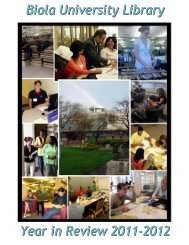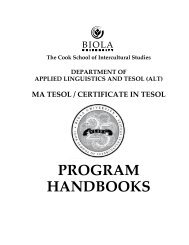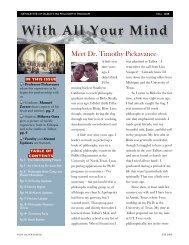PROGRAM HANDBOOKS - Biola University
PROGRAM HANDBOOKS - Biola University
PROGRAM HANDBOOKS - Biola University
Create successful ePaper yourself
Turn your PDF publications into a flip-book with our unique Google optimized e-Paper software.
Cook School of Intercultural Studies<br />
Applied Linguistics & TESOL Program Handbooks<br />
NON-NATIVE ENGLISH SPEAKERS SECTION 4.2<br />
3. A community college near you may offer some useful courses, for example, “Pronunciation<br />
Improvement” or “Business Communication.”<br />
4. A private tutor might be the best use of the time and money you have available for language<br />
proficiency development. The staff at ELSP can help you find a tutor who can ensure that you<br />
get what you need as a graduate student and as a future English teacher. Be prepared to tell<br />
your tutor exactly what you want: help in writing academic papers, pronunciation coaching,<br />
etc. Costs can vary widely, e.g., from $15 to $35 an hour. You might also be able to exchange<br />
skills (e.g., Korean language tutoring for English language tutoring).<br />
Again, if you have concerns about language proficiency, feel free to talk with any of the faculty.<br />
Future employment may also be an issue on your mind. You may wonder if it is possible for you<br />
as a nonnative speaker to get a job in the U.S. If you are returning home or going to another country<br />
where English is a foreign language, you may wonder about meeting discrimination from employers<br />
who are blatant about their preference for native speakers or even for teachers who are Caucasian. We<br />
decry such prejudice and believe that teachers should be assessed by their teaching ability, not their<br />
status as native or nonnative or by their race (see Amin, 1997). Although we may not be able to<br />
change the unfortunately reality of discrimination in the workplace, we would be happy to talk with<br />
you about it and offer any assistance we can in directing you to employers who would welcome your<br />
skills.<br />
In addition, you are strongly encouraged to join local, state, national, and international teacher<br />
associations, such as CATESOL and TESOL, and participate in their annual professional conferences<br />
so that you can network with other nonnative language teachers and teacher-trainees in the TESOL<br />
field. For instance, you can want to consider joining an interest group in CATESOL called Non-Native<br />
Language Educators’ Issues (NNLEI) at http://nnlei.wordpress.com/, or TESOL’s called Nonnative<br />
English Speakers in TESOL (NNEST) Interest Section at http://nnest.asu.edu/.<br />
Finally, some of our graduates have gone on to teach their native languages such as Chinese or<br />
Korean. You might want to talk to the faculty about this possibility, too.<br />
Books and Bibliographic Resources Recommended for Further Reading<br />
You may find an extensive bibliography on NNESTs on TESOL’s NNEST Interest Section at<br />
http://nnest.asu.edu/NewBibliography1.html. The following are only a few bibliographic resources<br />
recommended for your initial reading.<br />
Date: August 2012 Page 2 of 4


